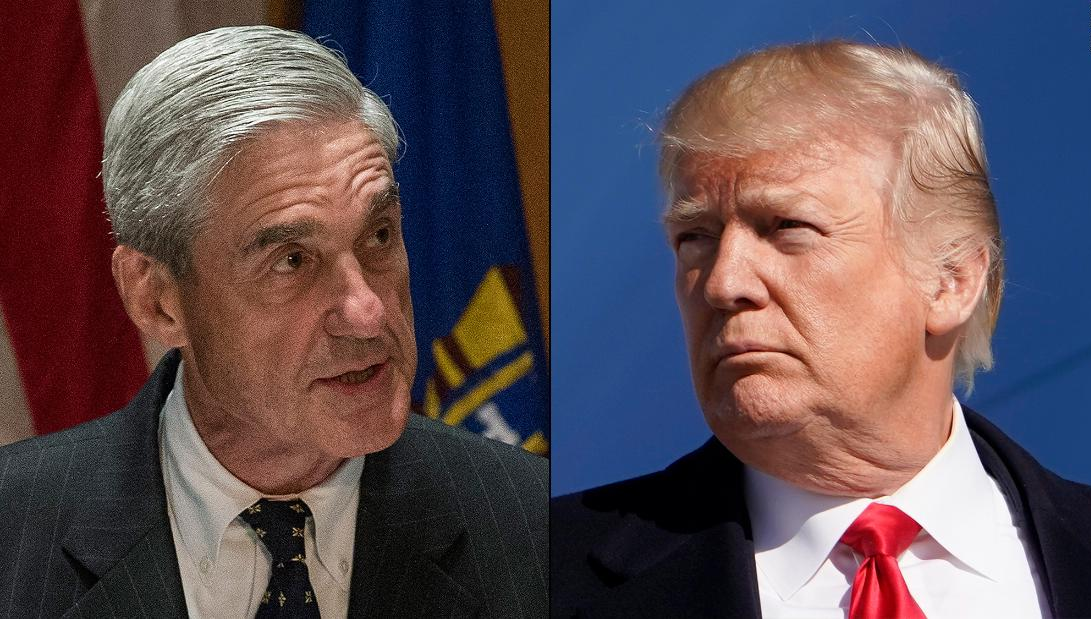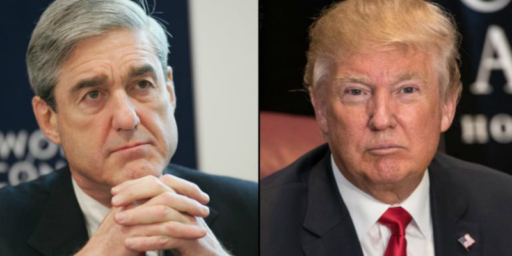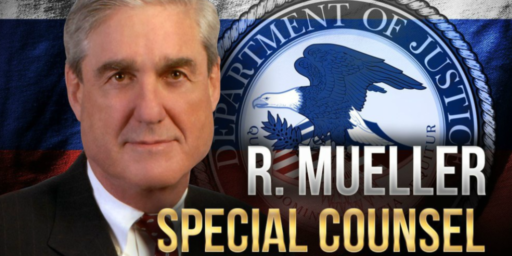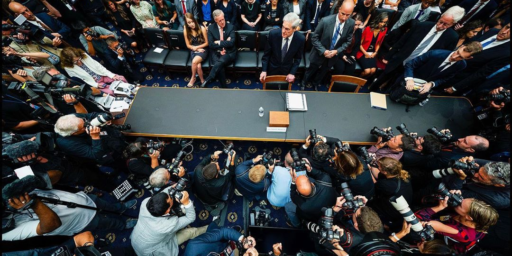Has Robert Mueller Already Subpoenaed The President?
A bunch of mysteriously sealed filings in Federal Court in D.C. could mean that Robert Mueller has already subpoenaed the President.

In a piece for Politico Magazine, Nelson Cunningham, a former federal prosecutor who served under Rudy Giuliani when he was the U.S, Attorney in New York and later served on the Senate Judiciary Committee under Joe Biden and in the Administration of Bill Clinton, offers some interesting and convincing evidence that Special Counsel Robert Mueller has already drafted and filed a subpoena directed at the President of the United States:
[T]hanks to some careful reporting by Politico, which I have analyzed from my perspective as a former prosecutor, we may have stumbled upon How Bob Mueller Is Spending His Mid-Terms: secretly litigating against President Trump for the right to throw him in the grand jury.
As a former prosecutor and Senate and White House aide, I predicted here last May that Mueller would promptly subpoena Trump and, like Independent Counsel Kenneth Starr back in 1998, bring a sitting president before his grand jury to round out and conclude his investigation. What Trump knew and when he knew it, and what exactly motivated his statements and actions, are central to Mueller’s inquiry on both Russian interference and obstruction of justice.
(…)
The evidence lies in obscure docket entries at the clerk’s office for the D.C. Circuit. Thanks to Politico‘s Josh Gerstein and Darren Samuelsohn, we know that on August 16th (the day after Giuliani said he was almost finished with his memorandum, remember), a sealed grand jury case was initiated in the D.C. federal district court before Chief Judge Beryl A. Howell. We know that on September 19, Chief Judge Howell issued a ruling and 5 days later one of the parties appealed to the D.C. Circuit. And thanks to Politico‘s reporting, we know that the special counsel’s office is involved (because the reporter overheard a conversation in the clerk’s office). We can further deduce that the special counsel prevailed in the district court below, and that the presumptive grand jury witness has frantically appealed that order and sought special treatment from the judges of the D.C. Circuit—often referred to as the “second-most important court in the land.”
Nothing about the docket sheets, however, discloses the identity of the witness. Politico asked many of the known attorneys for Mueller witnesses—including Jay Sekulow, another Trump lawyer—and every one denied knowledge of the identity of the witness. (What, of course, would we expect a lawyer to say when asked about a proceeding the court has ordered sealed?)
But for those of us who have been appellate lawyers, the brief docket entries tell a story. Here’s what we can glean:
- The parties and the judges have moved with unusual alacrity. Parties normally have 30 days to appeal a lower court action. The witness here appealed just five days after losing in the district court—and three days later filed a motion before the appellate court to stay the district court’s order. That’s fast.
- The appeals court itself responded with remarkable speed, too. One day after getting the witness’s motion, the court gave the special counsel just three days to respond—blindingly short as appellate proceedings go. The special counsel’s papers were filed October 1.
- At this point an unspecified procedural flaw seems to have emerged, and on October 3, the appeals court dismissed the appeal. Just two days later, the lower court judge cured the flaw, the witness re-appealed, and by October 10 the witness was once again before appellate court. Thanks to very quick action of all the judges, less than one week was lost due to a flaw that, in other cases, could have taken weeks or months to resolve.
- Back before the D.C. Circuit, this case’s very special handling continued. On October 10, the day the case returned to the court, the parties filed a motion for expedited handling, and within two days, the judges had granted their motion and set an accelerated briefing schedule. The witness was given just 11 days to file briefs; the special counsel (presumably) just two weeks to respond; and reply papers one week later, on November 14 (for those paying attention, that’s 8 days after the midterm elections). Oral arguments are set for December 14.
We cannot know, from the brief docket entries that are available to us in this sealed case, that the matter involves President Trump. But we do know from Politico‘s reporting that it involves the special counsel and that the action here was filed the day after Giuliani noted publicly, “[W]e’re pretty much finished with our memorandum opposing a subpoena.” We know that the district court had ruled in favor of the special counsel and against the witness; that the losing witness has moved with alacrity and with authority; and that the judges have responded with accelerated rulings and briefing schedules. We know that Judge Katsas, Trump’s former counsel and nominee, has recused himself. And we know that this sealed legal matter will come to a head in the weeks just after the midterm elections.
If Mueller were going to subpoena the president—and there’s every reason why a careful and thorough prosecutor would want the central figure on the record on critical questions regarding his knowledge and intent—this is just the way we would expect him to do so. Quietly, expeditiously, and refusing to waste the lull in public action demanded by the midterm elections. It all fits.
Since the docket is currently sealed, it is, as Cunningham readily admits, impossible to know for sure exactly what or whom the subject matter of the subpoena that is apparently set to be litigated in December may be about. However, it seems logical to believe that the party in question must be someone high-profile and that the effort to keep it sealed, which is generally contrary to the openness with which Federal Court proceedings are conducted, is a strong indication that whoever that person is, it is someone high profile. In that regard, it’s worth noting that Mueller’s office has been abiding by the long-standing Justice Department policy of not taking any public action that may impact the election within 60 days prior to the election. This is one of the main reasons why we have not heard anything from the investigation other than ongoing legal proceedings involving Paul Manafort and George Papadopoulos from the Mueller legal team since Labor Day. The fact that this matter is sealed suggests that the subject of the case is someone significant whose identity, if it were public, would have an impact on the elections in a way that would violate existing Department of Justice guidelines were it made public. This raises the possibility that, after Election Day, we’re likely to see a flurry of activity from Mueller, including, potentially, the unsealing of the legal proceedings that Cunningham and Politico’s intrepid reporters have uncovered simply by looking at the docket.
If the President is the subject of this legal proceeding, then this would obviously raise some significant legal questions that may ultimately have to be resolved by the Supreme Court at some point in the near future. The biggest question from a legal point of view that a subpoena would raise, of course, is whether or not a sitting President can be subpoenaed to testify. Originally, Whitewater prosecutor Ken Starr had subpoenaed President Bill Clinton to testify before the Grand Jury he had convened, but he agreed to withdraw the subpoena after Clinton agreed to appear voluntarily. Therefore, the legal question of whether or not Clinton could be subpoenaed was never ruled on by a Court. While this would be a case of first impression, though, it seems clear that the best authority is on the side of the idea that a President can be subpoenaed.
The most favorable precedent from Mueller’s point of view, of course, would be United States v. Nixon, which dealt with the efforts of Watergate Special Prosecutor Leon Jaworski to subpoena the tape recordings that Nixon had made of conversations in the Oval Office that included conversations he had with top aides regarding the Administration’s response to the Watergate break-in. Jaworski had subpoenaed these tapes shortly after John Dean confirmed to the Watergate committee that there was a recording system in the Oval Office. Initially, the Nixon Administration resisted the subpoena, citing executive privilege among other grounds for withholding the requested tapes. In an expedited ruling, the Supreme Court ruled unanimously, with Justice Rehnquist recusing himself due to his previous position in the Justice Department, that Nixon must turn over the tapes. This, of course, led to the revelation of conversations so incriminating that they made Nixon’s impeachment and removal from office a virtual inevitability. Instead of facing that fate, Nixon resigned.
Given the Nixon precedent, it seems fairly clear to me at least that Trump would be on the losing side of a legal fight over the validity of any potential subpoena. If Oval Office tapes can be subpoenaed then there doesn’t seem to be any reason why the President himself can be subpoenaed to testify as a witness. Of course, if the Russia investigation heads down this path it would like mean months of litigation in the Federal Courts and, ultimately a decision by the Supreme Court. While anything is possible and the makeup of the Court has changed significantly from what it was in 1974 I don’t think that even this court would be willing to ignore the Nixon precedent. For that reason alone, I suspect that eventually, Trump will agree to some kind of interview with Mueller at which his lawyers can be present, but it’s likely to take both sides some time to come to terms on what kind of interview that’s going to be.
The context of all of this, of course, is the question of whether or not the President would make himself available for an interview with the Special Counsel. In that regard, it was reported several weeks ago that Mueller’s office and Trump’s lawyer had reached an agreement that the, at least at first, the President would answer written questions related to the collusion side of the investigation, and it appeared from the context of the reporting that Mueller’s office had already submitted those questions to Trump’s attorneys. From Trump’s perspective, of course, written questions are most advantageous because the responses will be drafted by his attorneys and Mueller’s investigators would be precluded from asking follow-up questions. From the reporting, though, it was clear that these written questions were only the first step in a process and that Mueller had not dropped the idea of either an in-person interview or a subpoena to appear before the Grand Jury.
From Trump’s perspective, the biggest disadvantage of a subpoena over a voluntary interview is the fact that, in the former case the witness in question would be subpoenaed to appear before a Grand Jury. In that situation, they would be in the Grand Jury room alone with the presiding prosecutors and the members of the Grand Jury. In most cases, any attorney representing the witness is not allowed in the room, and if they were they would not be able to object to any questions. Additionally, they could not prevent the prosecutor from asking questions via an objection or another legal maneuver, and they would not be able to halt their client from rambling on in response to questions in a manner that could end up incriminating them or leading them to provide false or misleading responses to question. For someone like Trump, this is clearly a more dangerous situation than an interview with Mueller and his investigators at which his attorneys would be present to assist him. As such, it’s a situation that Trump’s attorneys would most likely want to avoid.
Admittedly, this is all speculation but as Cunningham notes the speed with which this proceeding has moved, the fact that it has been sealed, and the fact that the only Trump appointee on the Court of Appeals for the D.C. Circuit recused himself from an en banc review of whatever it is was pending before the Court all point toward the high probability that the witness in question is either the President himself or, possibly someone very close to him. In any case, subpoenaing the President in this situation would raise significant legal issues and would be a significant step by Mueller. If that’s what all of this mysteriously sealed argument is all about, then things could become very interesting after Election Day.
So, let’s keep an eye on this one, shall we?





Are you really so naive you think people like Samuel Alito, Clarence Thomas and Brett Kavanaugh will vote the law rather than support the Republican Party? Give me a break. Bush v. Gore. These are political hacks who will support their patrons. The whole point of Kavanaugh was to protect Trump from Mueller.
@Michael Reynolds: Perhaps I’m naive too, but I tend to think that just like with the PPACA case, if this topic comes before the SCOTUS the big story will be conservatives outraged at Chief Justice John Roberts rather than celebrating Brett Kavanaugh. Although it’s not even a foregone conclusion that any of the conservative Justices would necessarily ignore the Nixon precedent.
So, a shock collar would be allowed? Because absent that I don’t think his lawyers will be able to shut trump up.
@Todd: I guess I am naive 3.
I suspect this is more likely about the lesser Dennisons. These things start on the outside edges and work in. What we know publicly is that Mueller is currently focused on Stone, Manafort, Cohen, and Bannon. All of them are still, at least, one concentric ring away from Dennison. Who is in that next ring? Donnie Jr., Ivanka, Jared the Cuckhold*, and Eric. My bet is that this is about either Jr. or the Cuck.
@Michael Reynolds:
Justice Boof.
* A lot of people are saying that Dennison schtups Ivanka while Jared is locked in a cage at the side of the bed. I have no personal knowledge of this, but a lot of people are saying it.
And others…
I am intrigued by Cunningham’s analysis but for two things: (1) the WH has shown no ability to keep anything secret so how could the defend the subpoena without somebody bragging about it off the record? wouldn’t it be equally likely that Trump would want to talk about this as part of his victim complex, even against the advice of counsel? (2) having seen the WH’s inability or unwillingness to keep things secret, would Mueller really risk this becoming public in the shadow of the election? He seems more careful than that.
@Joe:
It’s possible, though not likely, that Dennison doesn’t know. That is, maybe his lawyers tried to tell him and he wouldn’t listen. he strikes me as the type of PHB who talks over his subordinates and doesn’t want to hear the end of any sentences.
If this gets into Fox News, maybe he’ll find out.
@Kathy: PHB? Pig headed bastard? Purple haired bastard (color blinded version)?
@SenyorDave: Pointy-Haired Boss. It’s a Dilbert reference.
@Jay L Gischer:
Yes. But “pig-headed bastard” fits El Dennison even better.
@Kathy: Fair enough.
@One American:
I’m not…but people are saying it. Lot’s of people. They’re saying it.
Also…Dennison himself talks about doing her.